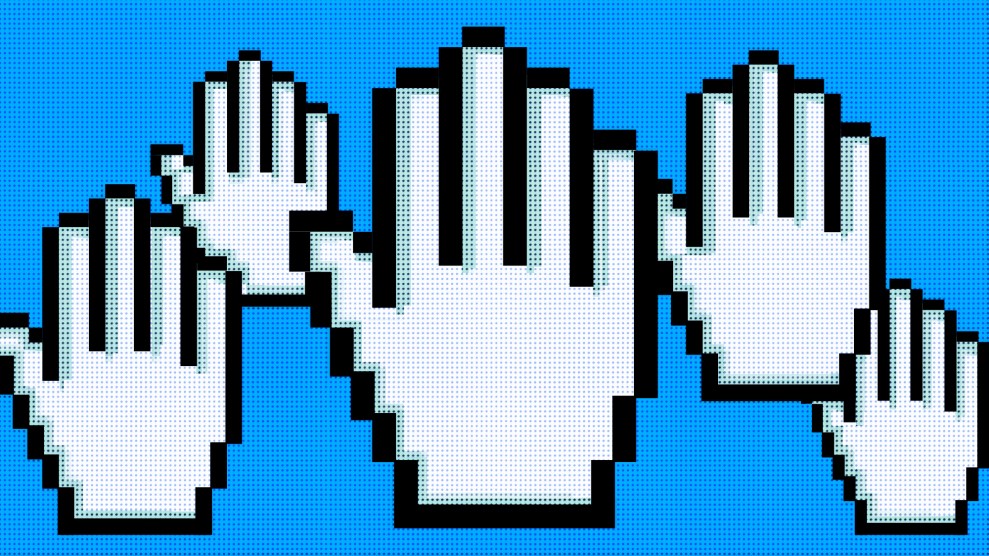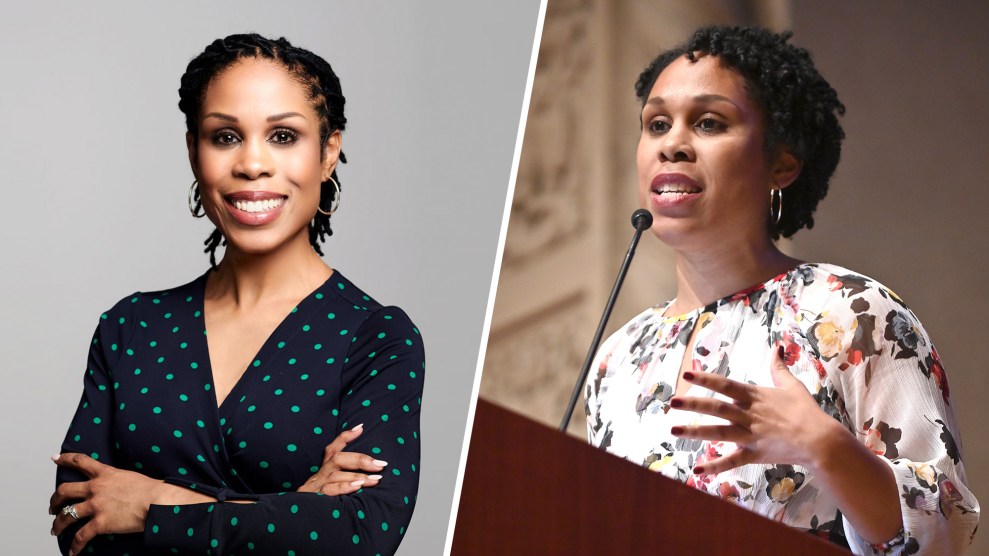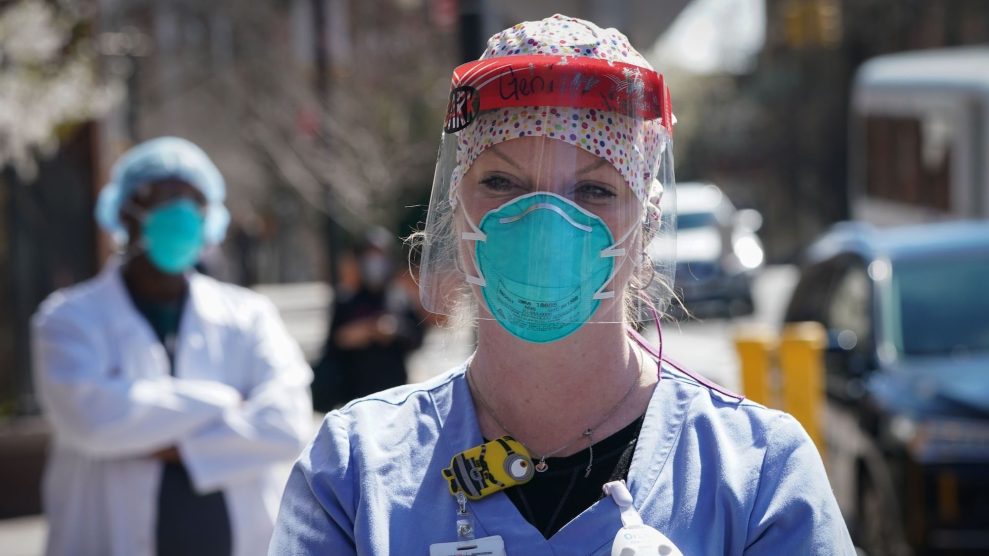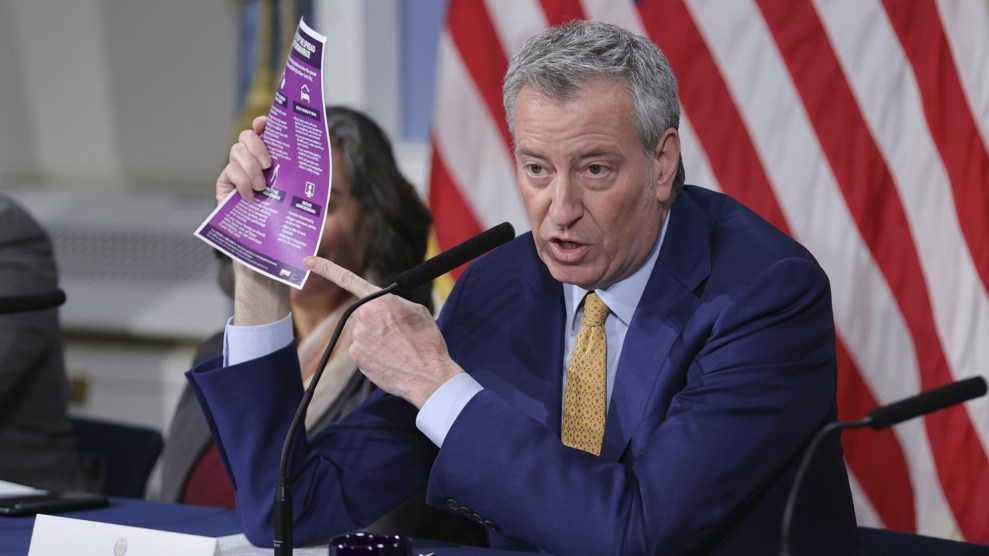
Mother Jones illustration; Getty
J. Khadijah Abdurahman, a single parent living on Roosevelt Island in New York City, works full-time as an independent researcher focusing on race and surveillance technologies. In 2011, Abdurahman started fostering her four nieces and nephews. Eventually she adopted all of them, and they joined her biological son, who was born in 2008. Her three sons and two daughters range in age from 5 to 13. Each attends a different school, and they all have disabilities. Abdurahman and her kids share their two-bedroom apartment with Abdurahman’s mother, who also works full-time as a nurse practitioner at Memorial Sloan Kettering Cancer Center and helps take care of the kids. Pre-coronavirus, getting all of the kids to school in the morning and coordinating their child care after school was a carefully orchestrated operation. Now, Abdurahman and her mother are focused on helping them coexist in tight quarters while they attend virtual schools.
On Friday, March 13, the day after the World Health Organization declared the coronavirus a pandemic, and a week before New York City Mayor Bill de Blasio made the decision to close the city’s public schools, Abdurahman kept her kids at home. “It felt like public schools were going against World Health’s guidance,” she said. Now, they’ve all been learning online for about a month, with materials she describes as “asynchronous,” meaning that they are receiving and completing their assignments without the real-time supervision of an instructor. Abdurahman has been spending 20 hours a week managing her children’s virtual education in addition to her full-time work, which has also gone remote. Since the start of quarantine she’s launched a new “We Be Imagining” podcast, an outgrowth of her work on an eponymous project at Columbia University, about the intersection of race, tech, surveillance, and COVID-19. One of the episodes focused on “NYPD’s surveillance apparatus, the spread of COVID in Rikers Island and what it means to police the pandemic.” She retreated to a space beneath her daughter’s loft bed in order to record it.
I caught up with her to find out what it’s been like juggling five virtual educations from the epicenter of the coronavirus. Our conversation has been edited for clarity.
On her oldest daughter:
Her 13-year-old daughter attends Democracy Prep New York Charter Schools in Harlem. Her distance learning platforms are Zoom and Google Classroom.
The week that the city closed schools, they rolled out their virtual platform. Mainly it seems to be successful. The only bump in the road was when the gym teacher requested they take videos of themselves working out, and I was like, absolutely not. She might be failing gym, but I’m not having my 13-year-old daughter sending videos of her jumping around to a male gym teacher.
Most of her virtual school is asynchronous. She has Zoom classroom advisory meetings twice a week, but the rest is just a set of assignments and the workload in general is pretty low. She probably spends 10 hours a week on schoolwork. I’m actually thrilled with her school because I just think that it’s not realistic to think they’re going to be learning tons and tons of information. Plus, she’s been panic baking— making cupcakes, cheesecake, butter cookies, hamantaschen. I’m just like, yeah, I can work with this.
Part of the whole model of charter schools is that they’re hyper-obsessed with college. They started college tours in the seventh grade. But that said, Democracy Prep has the highest suspension rate in the city. I only put her there because it was almost 100 percent Black, and I felt like they had better expectations for her than the predominantly white public school that she went to.
On her oldest son:
He’s 11-years-old and in sixth grade at the NYC Lab School—a public secondary school. His distance learning platforms were first Zoom and Google Classroom; then Zoom was banned by the NYC Department of Education, so the school switched to Microsoft Teams.
His school is pushing me towards a nervous breakdown. He’s high-functioning on the autism spectrum and is in a program which is a partnership between the DOE and NYU to create these specialized, integrated co-teaching classrooms. He goes to this really highly competitive, top-rated public school, but he’s within this specialized program for kids on the autism spectrum. My main concern is that he’s really difficult. He’s vehemently opposed to school in general. He hates virtual school, and he’s transparent with them. He told them he’s grieving the loss of all of his independence.
Now he has a full 9 a.m. to 2 p.m. schedule of virtual school. He gets a checklist of seriously weighted assignments to complete every single day: reading responses, science quizzes, math worksheets…The majority of it is asynchronous. The only synchronous portions are office hours and lectures from 10 a.m. to 1:30 p.m., with a half-hour lunch break. He does not want to do it at all. I try to monitor him, but besides not having time, in his defense, it’s like watching paint dry. I mean, it’s extremely unidirectional, no interaction. They’re just lecturing at him. Especially for kids with disabilities, he doesn’t have those organizational skills to review the work and come prepared with questions. And so they’ll reach out to me, because he’s facing his Google Meets calls to the wall, and walking away. He’s often logging off the calls. They email, text, and call me constantly because of either inappropriate comments that he’s making on Google Classroom, or emails that he sent school-wide saying, “It’s COVID time, I’m not doing this.”
In their defense, I think they only had 36 hours or something like that to put together a virtual learning program. But it was really evident that they just threw this together. And they have no sense of humor. For example, they have these questions to verify his attendance. They asked him, “Are you here today?” And he wrote “No.” So they contacted me, saying, “He’s not here, is everything okay?” And I’m like, he’s joking around. How could he select no if he wasn’t there? Guys, come on.
My concern was that since he goes to such a hyper-competitive school, and there’s such a high rate of compliance among those people, he will be identified as an outlier. Since all these people are paranoid about abuse right now, I did not want him to be labeled as truant, and have the Administration for Children Services or anything else involved. I’ve been keeping documentation. Maybe there’s one other Black kid. He might be the only one.
On her middle son:
Her middle son, who is 8 years old, should be in the second grade but, as his mother says, he’s “not in any kind of school right now.”
He had autoimmune encephalitis, or “brain-on-fire” and was attending a partial hospitalization program. So when I decided to keep him home on that Friday [before the city closed schools], they automatically discharged him. He had a notice to be placed in a specialized classroom in our local public school. I reached out to start enrolling him there, but it’s been radio silence, even from the Board of Ed. He’s been doing really well at home. I mean, it’s kind of crazy that he’s doing well in the midst of a pandemic.
Previously he was going to a prep school, so I reached out to them, and they’ve been much more responsive. He might go back there, but they just went on spring break, because unlike public schools they’re still honoring spring break. So I’m waiting to hear back from them.
On her youngest son:
He attends first grade, with other 6-year-olds, at Gillen Brewer School on the Upper East Side. Google Meet is his distance-learning platform.
He goes to a private elementary school that’s all special education. He has high anxiety and now all of these environmental accommodations that really helped him self-regulate are totally gone. We’ve lost all these relationships and structure. So he spends a lot of time running around like Chicken Little. And to keep him calm is like its own job on top of everything else.
His school started doing classroom meetings that were synchronous over Google Meet. It happens daily at nine o’clock. Seeing his friends and seeing his teachers every morning, keeping a relational connection, is helpful. I don’t necessarily think that it enhances his learning, but it’s comforting, and it adds a level of structure. The classroom meeting is 30 minutes, and then he has about 30 minutes of activities. But they’re easy. Like, when you’re eating snack, the kids have a conversation about what happened today.
The thing that I appreciate about his school is that they were—look, our entire school is designed to have these highly trained professionals working with your kids at a “10 to one to three” ratio. This is not going to be like that. There’s no way that we can translate the school to virtual. I think everybody with special needs cases are already super overwhelmed. Now they’ve created an at-home learning program that they upload to Google Classroom. They have therapists so that you can sign up for therapist calls, but honestly, I wrote them today saying, “I cannot implement this.”
On her youngest daughter:
Her 5-year-old daughter attends pre-K at Lenox Hill Early Childcare Center, where the kids use Zoom.
She was attending a Head Start program. They feed the kids three times a day, and they predominantly serve a Hispanic and Central American population. Head Start is based on your income, so you have to be within a certain percentage of the federal poverty line. This is definitely a population of people they were worried could lose childcare, food. And a lot of people don’t have internet access or access to computers. I think pre-K in general hasn’t had virtual school. This week the teachers started doing check-ins, and they’re trying to do a classwide Zoom call once a week. But basically, it’s been nothing. They just send us emails with links for online games and stuff like that.
On her own workload:
I tried early on in the game to implement all these learning activities. But honestly, it’s just really challenging. Given the economically precarious climate, it feels like I just have to prioritize working because I don’t want to lose income when I have five other people besides myself to provide for. I don’t know how anyone could possibly micromanage all this virtual learning while working full-time, cooking 21 meals a day, making homemade masks and cleaning, and dealing with people in my life who are dying from COVID. It’s just totally impossible.
This is a crisis. It is a pandemic, and especially for single parents with multiple children, and then on top of that, their disabilities. It’s non-viable for us to implement some rigorous curriculum, on top of working and just the entire stress of the situation. I would say the thing that’s most horrifying to me is that, anecdotally, I hear that people are still having Children’s Services call on them. And I worry that if you cannot adhere to these unrealistic expectations that you could be subject to further surveillance, and potentially even incarceration. It’s just like a third layer of stress. But, in the end it’s like low-expectation theater.
On social distancing:
We take a walk at least once a day, but it does get a little dry because the parks are all closed and we live on Roosevelt Island, which is kind of visually unstimulating. Sometimes we walk all the way south. And sometimes we walk all the way north. But it’s like the same thing over and over again. And then we have to carefully plan it because it’s an island. There’s not a lot of square footage for the 14,000 people. So social distancing is difficult.
Plus we’re trying to make homemade masks. The kids, who don’t like to wear masks, have to wear masks. I think the first week was okay, but we’re definitely getting to a point where everybody is high-anxiety. A lot more tantrums and kind of going nutty.
On how she’s managed to keep her energy up:
A lot of coffee. A lot of Red Bull.
On how she’s stayed sane:
Making the podcast, reading books by Black folks, loving on my kids.
















